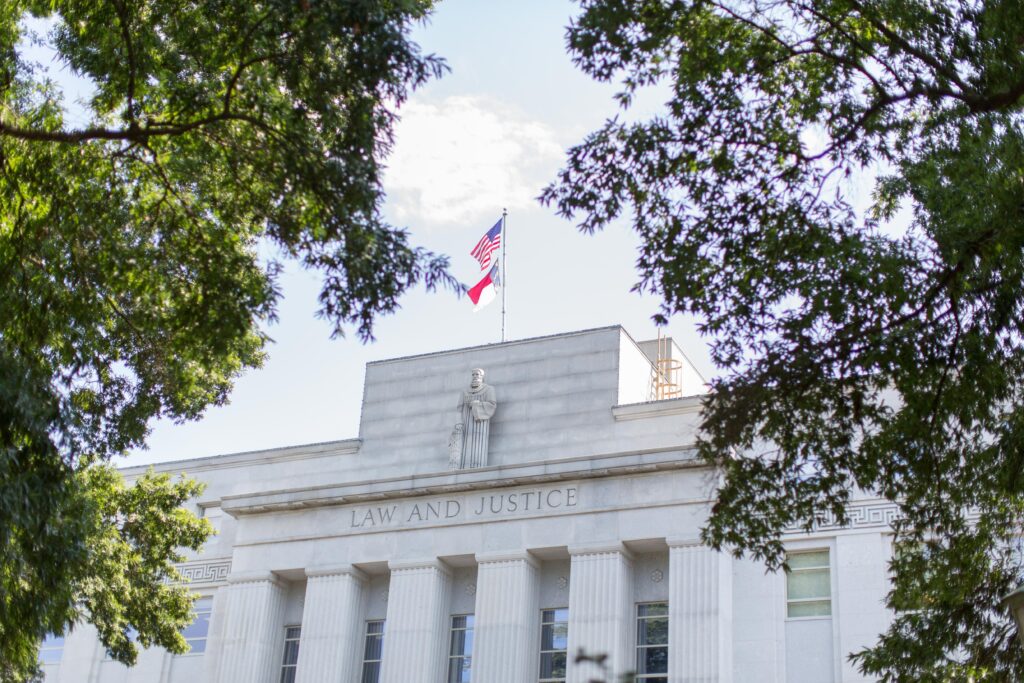
Russell Tucker was a Black man facing the death penalty in the South in the “tough-on-crime” 1990s. He deserved the chance to be tried by a jury of his peers — people who might have had similar life experiences and been able to see him as something other than a one-dimensional “monster.” However, a Forsyth County prosecutor stole that chance at justice, which is supposed to be guaranteed by law.
The prosecutor came up with reason after reason why Black people could not remain on the jury. They were “monosyllabic.” They “didn’t make eye contact.” They “lacked a stake in the community.” One by one, the court allowed the prosecutor to send all the Black jurors home. Russell Tucker ended up with an all-white jury that did exactly as the prosecution asked: They deemed a young Black man unworthy of life.
Mr. Tucker, who has been on North Carolina’s death row since 1996, is represented by CDPL Senior Attorney Elizabeth Hambourger, along with co-counsel Tom Maher. On Feb. 8, Ms. Hambourger will argue before the North Carolina Supreme Court that racism illegally shaped Mr. Tucker’s jury. Details about how to attend or watch the arguments are here.
The issue before the court is not whether Mr. Tucker committed a terrible crime; he has admitted to killing a security guard outside a Kmart during a desperate and drug-fueled time in his life. Instead, the issue is whether our state will allow brazen racism in death penalty trials.
The racism we’re talking about doesn’t just affect people on trial for their lives, though all-white juries have been shown to convict more easily, even when defendants are innocent, and to sentence more people to death. Jury discrimination also deprives citizens of their Constitutional right to wield power in our democratic system.
In Mr. Tucker’s case, one working mother showed up for jury service only to be told in open court that she had no “stake in the community.” She’d lived her entire life in Forsyth County and was raising her children there, but the prosecutor pointed out that she rented her home, was not registered to vote, and her husband had been at his job “for only four months.” The judge allowed this strike, even though the prosecutor accepted a white juror who was also a renter, five white jurors who were not registered to vote, and two white jurors whose spouses were unemployed.
The state’s message was so clear they could’ve written it on a billboard: Black people don’t deserve a voice in our community.
The exclusion of Black jurors is not just a problem in Mr. Tucker’s case. It’s a statewide phenomenon in both capital and noncapital cases. It’s a particularly strong tradition in Forsyth County, where a recent Wake Forest University study found that prosecutors were three times more likely to strike African Americans than white jurors. Mr. Tucker is one of four people sent to death row by all-white Forsyth County juries.
The very same prosecutor who struck all the Black jurors in Mr. Tucker’s case also tried Henry White for his life. Mr. White was recently released from prison after his lawyers presented evidence that jurors were excluded because of their race.
This discrimination is not an accident. Prosecutors are trained for it.
Years after Mr. Tucker’s trial, his defense team found out the trial prosecutor had attended a training seminar where prosecutors were given a list of excuses they could draw from when they were asked to explain their exclusion of Black jurors. The list was full of dubious reasons including being disheveled, evasive, rebellious, or having an “air of defiance.”
These reasons were not just vague, subjective, and designed to disguise the prosecutors’ true motives; they were also rooted in racism. Bryan Stevenson described them as “derogatory labels applied to African Americans who did not show adequate deference to the prevailing racial order.”
At Mr. Tucker’s trial, the prosecutor read verbatim from this list when striking Black jurors. He accused one man of having “absolutely horrible” body language. He accused another of being “confused” and “monosyllabic” because he answered a list of yes-no questions with yes-no answers. Imagine showing up to court to do your civic duty and being talked about this way in public.
On Feb. 8, our state’s highest court has a chance to stop the degradation of Black citizens, which continues in our courtrooms today. The court must send a strong message that all North Carolinians have an equal right to a voice in our courtrooms.
